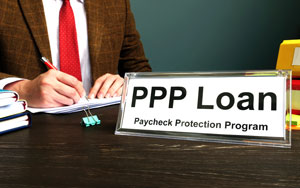The Biden administration announced five major changes in the Payroll Protection Program this week to make access to PPP loans more equitable, which could make a big difference for small businesses. Starting February 24, 2021, the U.S. Small Business Administration will begin accepting applications for PPP loans exclusively for businesses under 20 employees and sole proprietors.
The application period will occur over two weeks, with the SBA accepting program applications through March 10, 2021. If your business has 20 employees or less, check the SBA’s website to find a lender, find the right loan for you, and more. Borrowers may also be eligible for PPP loan forgiveness here.
These changes are critical for small business nationally, considering only an estimated 5 percent of small businesses have received support thus far. According to USA Today, we have said goodbye to 400,000 small businesses since the start of the pandemic. To help prevent these numbers from continuing to climb, it is vital that indie retailers receive the help and support they need to push through the pandemic.
SBA also announced four additional changes to open the PPP to more underserved small businesses than ever before. While these changes are being implemented, SBA will work with community partners to improve the emergency relief “digital front door” and conduct extensive stakeholder outreach. The organization will also strengthen its relationships with lender partners to advance equity goals, deliver funding efficiently, and prevent fraud, waste, and abuse.
Here are the four additional changes:
- Allow sole proprietors, independent contractors, and self-employed individuals to receive more financial support by revising the PPP’s funding formula for these categories of applicants
- Eliminate an exclusionary restriction on PPP access for small business owners with prior non-fraud felony convictions, consistent with a bipartisan congressional proposal
- Eliminate PPP access restrictions on small business owners who have struggled to make student loan payments by eliminating student loan debt delinquency as a disqualifier to participating in the PPP
- Ensure access for non-citizen small business owners who are lawful U.S. residents by clarifying that they may use Individual Taxpayer Identification Number (ITIN) to apply for the PPP.
A critical goal from Congress for the latest round of PPP was to reach small and low-and moderate-income (LMI) businesses who have not received the needed relief a forgivable PPP loan provides. Congress set a $15B set-aside for small and LMI first draw borrowers. With existing policies, the current round has only deployed $2.4B to small LMI borrowers, in part because a disproportionate amount of funding in both wealthy and LMI areas is going to firms with more than 20 employees. The less than 20 exclusivity period combined with the changes to expand access for sole proprietors, ITINs, returning citizens, and student loan debt will help us achieve Congressional goals.
Independent Retailer is the leading trade publication for independent retail store owners. Dedicated to business professionals who manage or own a brick & mortar retail establishment as well as to those with an online store, each monthly issue of Independent Retailer offers expert advice on wholesale buying and selling. Offerings from America’s leading importers and manufacturers are showcased in dozens of product categories, and buyers across the country use each issue as their supplier resource of choice. Here is the link to bookmark: https://independentretailer.com/
If you are not yet a BRA Retail Member, you can easily opt in to either Regular (no cost) or Distinguished ($99/yr.) Membership via this super simple join form

